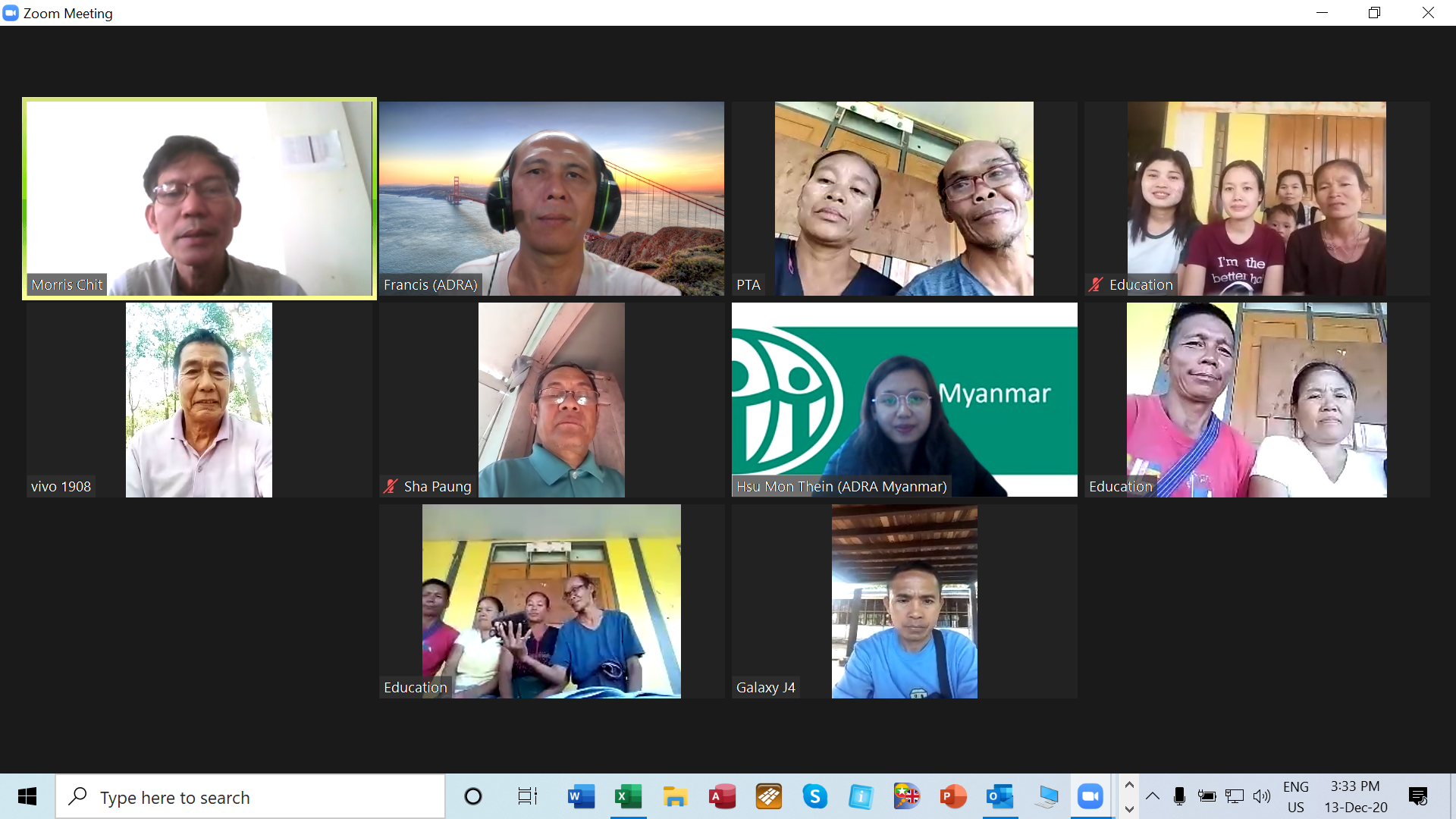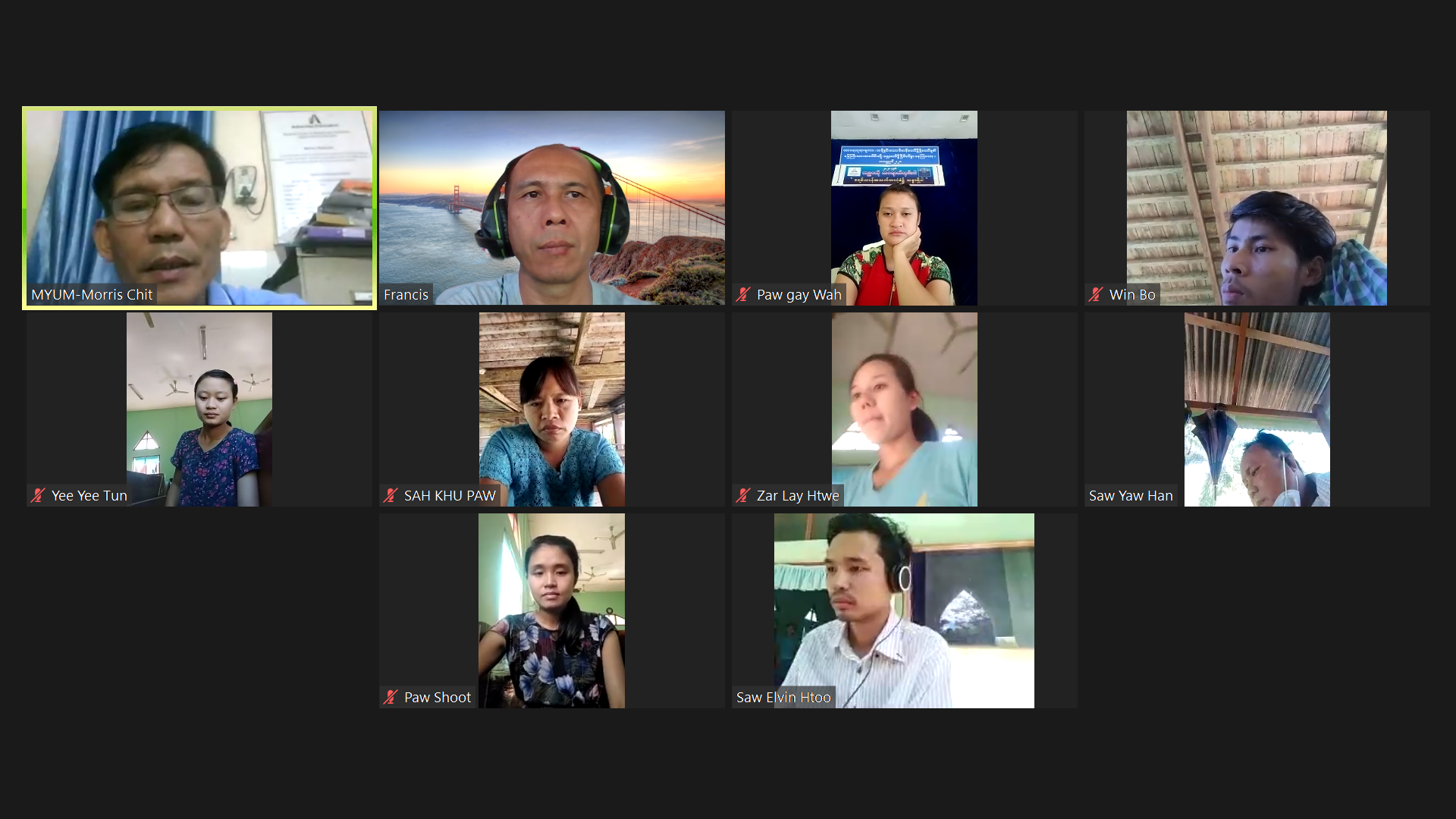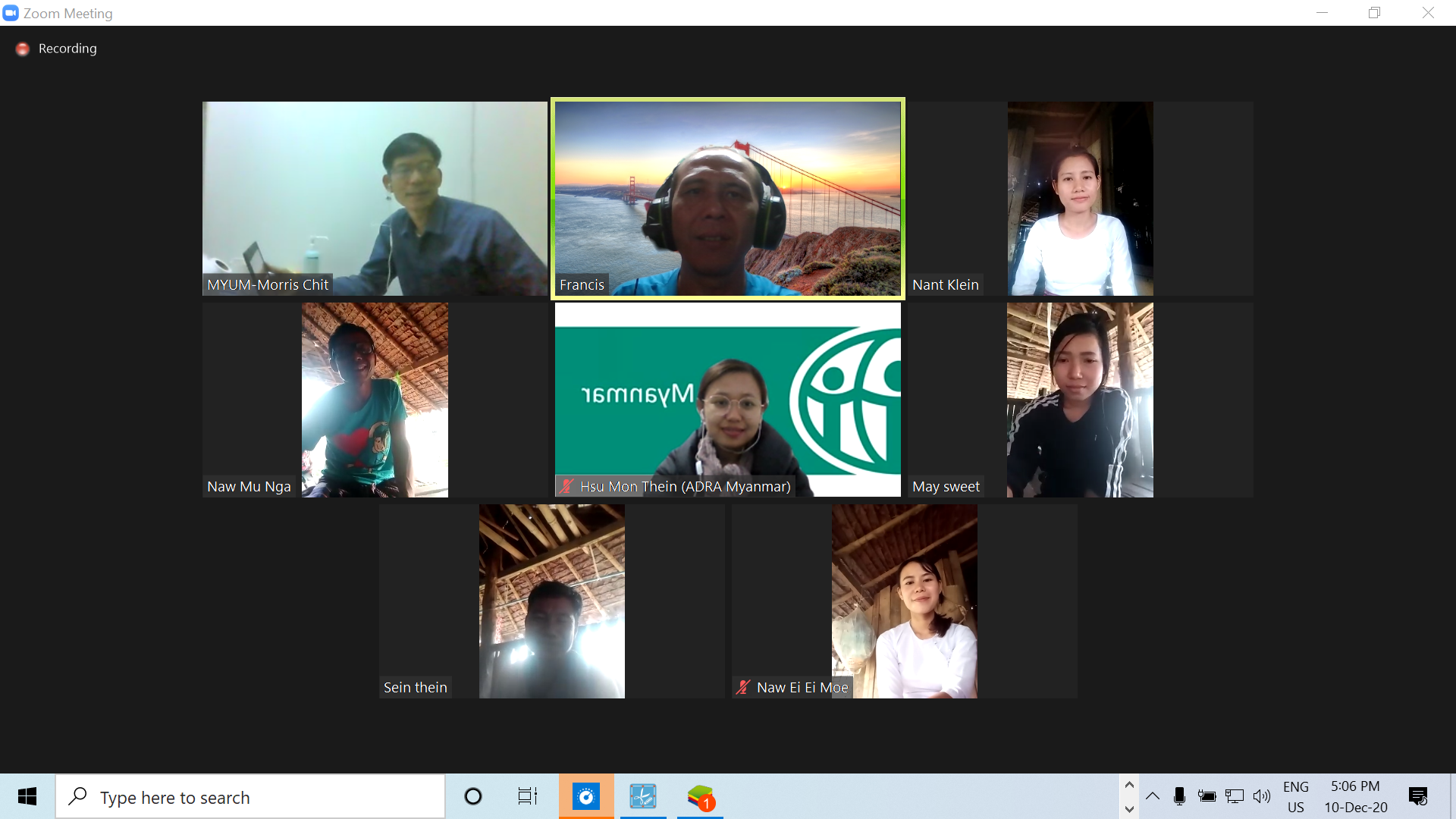The ADRA International funded ADVOCACY project in partnership with the Myanmar Union Mission, has recently been conducting meetings with community representatives from 5 villages in Mon State, Tanintharyi Region and Kayin State.

The ADVOCACY project aims to increase access to quality education for formerly excluded and disadvantaged children, in particular out-of-school children, in remote ethnic areas through the mobilization and sustainable financing of Non-Government teachers.
One of the projects key activities is to meet with local community representatives from around the 14 States and Regions in Myanmar to discuss Indigenous education in their communities, and the mobilization of Non-Government Teachers within their area.

Although community meetings were formerly planned as face-to-face meetings in order to explore the strengths and challenges of the community at the ground level for effective advocacy, due to COVID-19 and travel restrictions, this was not possible.
Instead, 5 meetings were conducted online through Zoom between staff representatives from ADRA Myanmar, Education Director Pastor Morris Chit from the Myanmar Union Mission and 39 community representatives from 5 villages including Thukhabe in Mon State, Thayetchaung in Tanintharyi Region, and Kyarinnseikgy, Padelkaw and Warkyel in Kayin State. These 5 villages already receive some support from the Seventh-Day Adventist (SDA) mission for education.

In the meetings, representatives discussed the present situation related to Non-Government teachers and out-of-school children in the aforementioned areas. Through these discussions, it was discovered that many children are unable to attend school because of poverty and a lack of education awareness amongst parents. Most villages only accommodate for Primary school aged children and parents often cannot afford to send their children to middle and secondary schools due to the remoteness of their villages and lack of financial income.
A parent from a local school committee commented “continuous education after finishing Grade 4 is difficult due to poor transportation to attend a government or SDA school for secondary and higher education, and due to money.” Instead, a number of out-of-school children are working on farms helping their parents, and many have migrated to the border areas for work.
Of the schools that are available, the infrastructure is old and requires reconstruction and repairs. Technical support for curriculum development is also needed, but the communities are afraid that schools will only employ Government teachers who do not teach mother tongue languages and support the communities’ Indigenous culture and religion, compared to Non-Government teachers who do provide these services. Non-Government teachers are however often paid a limited salary supported by the local community and SDA Mission or other religious association.
A Non-Government teacher commented, “we went to the government office and asked what we need to do to become a government school to receive support. They said they would send government teachers to our school if we registered as a government school. But after two years, all the community teachers from the school quit and now the villagers no longer want their children to attend the government school.”
The good news reported in these 5 villages is that the majority of former community school students now studying in Government schools can follow lessons well. There are students from many religions and areas studying in Government schools which can play a part in the development of Myanmar education.
ADVOCACY- ကျောင်းပြင်ပကလေးများနှင့် အစိုးရမဟုတ်သောဆရာများ၏လှုပ်ရှားမှုများအကြောင်း ဆွေးနွေးရန် ရပ်ရွာလူထုနှင့်တွေ့ဆုံခြင်း
ADRA International က ရန်ပုံငွေထောက်ပံ့ထားပြီး Myanmar Union Mission နှင့် အတူ ပူးပေါင်းဆောင်ရွက်နေသော ADVOCACY စီမံကိန်းသည် မကြာသေးမီက မွန်ပြည်နယ်၊ ကရင်ပြည်နယ်နှင့် တနင်္သာရီတိုင်းဒေသကြီးတို့ရှိ ကျေးရွာ ၅ ရွာမှ လူထုကိုယ်စားလှယ်များနှင့်တွေ့ဆုံဆွေးနွေးမှုများကို ပြုလုပ်ခဲ့သည်။
အဆိုပါစီမံကိန်းသည် အစိုးရဝန်ထမ်းမဟုတ်သော ဆရာ၊ ဆရာမများကို ရေရှည်တည်တံ့သော ငွေကြေးထောက်ပံ့နိုင်ရန်နှင့် ဝေးလံခေါင်ဖျားသည့်တိုင်းရင်းသားဒေသများရှိ ပညာသင်ကြားရန် အခွင့်အလမ်းနည်းပါးသော ကလေးငယ်များအနေဖြင့် အရည်အသွေးပြည့်မီသော ပညာရေးကို လက်လှမ်းမီစေရန် အဓိကရည်ရွယ်ဆောင်ရွက်နေခြင်းဖြစ်သည်။
စီမံကိန်း၏အဓိကလုပ်ဆောင်မှုမှာ တိုင်းဒေသကြီးနှင့် ပြည်နယ်၁၄ ခုတို့ရှိ ဒေသခံရပ်ရွာလူထု ကိုယ်စားလှယ်များနှင့် တွေ့ဆုံ၍ ၎င်းတို့ရပ်ရွာများရှိ ဌာနေတိုင်းရင်းသားများ၏ ပညာရေးအတွက် ယင်းနယ်မြေများအတွင်းရှိ အစိုးရမဟုတ်သော ဆရာများနှင့် စည်းရုံးဆွေးနွေးရန်လည်း ဖြစ်သည်။
ရပ်ရွာလူထု၏အားသာချက်များနှင့် စိန်ခေါ်မှာများကို ထိရောက်စွာစည်းရုံးလေ့လာနိုင်ရန်အတွက် ယခင်က လူထုနှင့်အတူ မျက်နှာချင်းဆိုင်တွေ့ဆုံဆွေးနွေးရန်စီစဥ်ထားခဲ့သော်လည်း ကိုရိုနာဗိုင်းရပ်စ်ရောဂါ ဖြစ်ပွားမှုကြောင့် ခရီးသွားလာမှုကန့်သတ်ချက်များရှိခဲ့ရာ ယင်းသို့ဆွေးနွေးရန်မှာ မဖြစ်နိုင်ခဲ့ပေ။
ယင်းကြောင့် ADRA Myanmar အနေဖြင့် Education Director လည်းဖြစ် Myanmar Union Mission မှ Pastor Morris Chit အပါအဝင် တနင်္သာရီတိုင်းဒေသကြီး၊ သရက်ချောင်း၊ ကရင်ပြည်နယ်၊ ကြာအင်းဆိပ်ကြီး၊ ပဒဲကောနှင့် ဝါကျယ်နှင့် မွန်ပြည်နယ်အတွင်းရှိ သုခဘီ ကျေးရွာငါးရွာတို့မှ ရပ်ရွာလူထုကိုယ်စားလှယ် ၃၉ ဦးတို့နှင့် တွေ့ဆုံဆွေးနွေးပွဲများကိုလည်း အွန်လိုင်း Zoom မှတစ်ဆင့်သာ ပြုလုပ်ခဲ့ရသည်။ အဆိုပါကျေးရွာငါးရွာသည် ပညာရေးအတွက် ခရစ်တော်ကိုမျှော်လင့်သောသတ္တမနေ့အသင်းတော်ထံမှ အကူအညီအချို့ ရရှိထားပြီးလည်းဖြစ်သည်။
အဆိုပါအစည်းအဝေးတွင် ကိုယ်စားလှယ်များသည် ယင်းဒေသများရှိ အစိုးရမဟုတ်သောဆရာများနှင့် ကျောင်းပြင်ပကလေးများနှင့် ပတ်သက်၍ လက်ရှိအခြေအနေများကို ဆွေးနွေးခဲ့ကြသည်။ ဤဆွေးနွေးမှုများမှလည်း ဆင်းရဲနွမ်းပါးခြင်းနှင့် မိဘများ၏ပညာရေးဆိုင်ရာ အသိပညာနည်းပါးခြင်း တို့ကြောင့် ကလေးများအနေဖြင့် ကျောင်းမနေနိုင်သည်ကို တွေ့ရှိခဲ့ရသည်။ ကျေးရွာအများစုသည် မူလတန်းကျောင်းအရွယ် ကလေးငယ်များအတွက်သာ နေရာထိုင်ခင်းရှိကြပြီး မိဘများအနေဖြင့်လည်း ဝေးလံခေါင်ဖျားမှုနှင့် ဝင်ငွေမရှိခြင်းတို့ကြောင့် အလယ်တန်းနှင့် အထက်တန်းကျောင်းများသို့ ပို့နိုင်ခြင်းမရှိပေ။
ဒေသခံကျောင်းကော်မတီမှမိဘတစ်ဦးလည်း “လေးတန်းပြီးပြီးဆိုရင် အစိုးရ ဒါမှမဟုတ် SDA က ဖွင့်တဲ့ကျောင်းကို အလယ်တန်းနဲ့အထက်တန်းကိုတက်ဖို့အတွက်က ငွေကြေးနဲ့ သွားလာရေး အခက်အခဲကြောင့် သွားရောက်မတက်နိုင်ပါဘူး။ အခက်အခဲတွေရှိပါတယ်” ဟု ဆိုသည်။
ယင်းအခက်အခဲကြောင့် ကျောင်းပြင်ပကလေးများအနေဖြင့် မိဘနှင့်အတူ လယ်ယာလုပ်ငန်းခွင်အတွင်း အလုပ်လုပ်ကိုင်ခြင်းနှင့် အများစုသည် နယ်စပ်ဒေသသို့ သွားရောက်ကာ အလုပ်လုပ်ကိုင်ကြရသည်။
ရရှိနိုင်သောကျောင်းများအနေဖြင့်လည်း အချို့သောစာသင်ကျောင်းအဆောက်အအုံများသည်လည်း ဟောင်းနွမ်းနေပြီး ပြန်လည်တည်ဆောက် ပြုပြင်ရန် လိုအပ်နေသည်။ သင်ရိုးညွန်းတမ်းများအတွက်လည်း နည်းပညာဆိုင်ရာ ပံ့ပိုးမှုများလိုအပ်သော်လည်း ကျောင်းများတွင် စာသင်ကြားသော အစိုးရမဟုတ်သော ဆရာများနှင့် နှိုင်းယှဥ်ပါက ဒေသခံလူထု၏ ဌာနယဉ်ကျေးမှု၊ ဘာသာနှင့် မိခင်ဘာသာစကားကို မသင်ကြားသော အစိုးရဆရာများကိုသာ ထားရှိမည်ကို ဒေသခံများက စိုးရိမ်ကြသည်။ အစိုးရမဟုတ်သော ဆရာများအနေဖြင့်လည်း ဒေသခံလူမှုအသိုင်းအဝိုင်းနှင့် SDA Mission သို့မဟုတ် အခြားသောဘာသာရေး အဖွဲ့များ၏ ထောက်ပံ့မှုဖြင့်သာ လစာကိုရရှိသည်ဖြစ်သည်။
အစိုးရမဟုတ်သော ကျောင်းဆရာတစ်ဦးက “အစိုးရရုံးကိုသွားပြီး အထောက်ပံ့ရဖို့၊ အစိုးရကျောင်းဖွင့်ဖို့ဆိုရင် ဘာလုပ်ရမလဲ မေးခဲ့တယ်။ သူတို့က အစိုးရကျောင်းမှတ်ပုံတင်မယ်ဆိုရင် အစိုးရကျောင်းဆရာတွေကို စေလွှတ်ပေးမယ်လို့ ပြောတယ်။ ဒါပေမဲ့၂ နှစ်ကြာပြီးနောက် ကျောင်းကရပ်ရွာဆရာတွေအကုန်လုံးလည်း ထွက်သွားကြတယ်။ ရွာသားတွေကလည်း သူတို့ရဲ့ကလေးတွေကို ကျောင်းမတက်စေချင်တော့ဘူး ဖြစ်ကုန်ရော ” ဟု ၎င်းက ရှင်းပြပြောဆိုသည်။
ယခုအခါ အဆိုပါကျေးရွာ ၅ ရွာမှ ရရှိသောသတင်းများအရ အစိုးရကျောင်းများတွင် ပညာသင်ကြားနေသည့် ရပ်ရွာကျောင်းသားများသည် သင်ခန်းစာများကို ကောင်းစွာလေ့လာနိုင်သည်။ မြန်မာနိုင်ငံ၏ ပညာရေးကဏ္ဍ ဖွံ့ဖြိုးတိုးတက်ရေးတွင်ပါဝင်နိုင်သော အစိုးရကျောင်းများတွင်လည်း ဘာသာပေါင်းစုံနှင့် ဒေသအများအပြားမှ ကျောင်းသားများသည် ပညာသင်ကြားလျက်ရှိသည်။
Originally Reported By: Francis, Advocacy Officer
Edited By: Emma McCrow, Communications Officer
Translated By: Pyae Phyo Lin, Communications Assistant
Photo: © 2020 ADRA Myanmar | Zoom





